In today’s technology-filled homes, voice assistants, doorbell cameras, and connected devices are becoming routine. But when divorce or custody proceedings begin, these “smart” devices can create unexpected legal questions. Can you use smart‑home recordings in court? What does Colorado law allow?
Smart‑Home Recordings as Evidence
Smart speakers, video doorbells, and surveillance systems may capture audio, video, timestamps, or behavioral data. This information might confirm or challenge claims about visitation compliance, hostile behavior, or general parenting conduct.
In Colorado, digital recordings can be introduced as evidence—if they are lawfully obtained and properly authenticated. Like other forms of evidence, the court will assess whether the information is relevant, whether it was collected legally, and whether it supports or undermines claims made in a divorce or custody case.
Colorado Law on Recording Conversations
Colorado follows a one-party consent rule for recording conversations. Under C.R.S. § 18‑9‑303, it is generally lawful to record a conversation if at least one person involved consents. That means you can typically record conversations you’re part of—such as a dispute with your spouse—without their knowledge.
However, intercepting or recording a private conversation between other people without any party’s consent may violate C.R.S. § 18‑9‑304, Colorado’s law against eavesdropping. Violations of this statute can result in misdemeanor criminal charges.
Admissibility Depends on How the Evidence Is Obtained
Smart‑home recordings that are gathered without proper consent or under deceptive circumstances may be excluded from court—or worse, lead to criminal charges. Even if a device is legally owned by one party, that doesn’t automatically make all recordings admissible.
Colorado courts weigh:
- Whether the recording was obtained in a manner that complies with the law;
- Whether the person being recorded had a reasonable expectation of privacy;
- Whether the recording is clearly attributed, unaltered, and relevant to parenting time or conduct;
- And whether the use of such recordings undermines the child’s best interests.
Family courts in Colorado have broad discretion in determining whether to admit or reject evidence based on these factors.
Privacy Expectations in the Home
Even when devices are used in the home, there are limits. In People v. Tafoya, 494 P.3d 613 (Colo. 2021), the Colorado Supreme Court found that prolonged warrantless video surveillance of a person’s fenced backyard by police violated constitutional protections under Article II, Section 7 of the Colorado Constitution.
While that case addressed government surveillance, its reasoning reinforces that Colorado courts take privacy expectations seriously—even in one’s own home. A family court may similarly view covert, non-consensual surveillance as inappropriate, especially when directed at co‑parents or children.
Practical Uses of Smart‑Device Evidence
When used lawfully, smart‑home recordings may assist in:
- Documenting parenting time compliance: Video or log data may confirm timely pickups/drop-offs.
- Capturing interactions: Voice recordings might demonstrate aggressive or inappropriate conduct.
- Corroborating allegations: Patterns of behavior caught on video may support or refute contested claims.
However, courts remain cautious about allowing surveillance data that crosses privacy lines or appears designed to control, intimidate, or manipulate.
Authentication and Evidence Rules
Like any evidence, smart‑home data must be properly authenticated under the Colorado Rules of Evidence. Under CRE 901, a party must show that the evidence is what it claims to be. This could include metadata, device logs, or witness testimony confirming the source of the recording.
Colorado’s evidence rules also prohibit hearsay unless an exception applies, and any recordings that contain statements must be evaluated under CRE 802 and related provisions.
Key Takeaways
- In Colorado, smart‑home recordings and voice assistant data can be used in divorce or custody cases—but only if lawfully obtained and relevant.
- You may legally record conversations you are part of, under Colorado’s one-party consent law, but may not record others without consent.
- Covert or excessive surveillance—especially of co‑parents or children—can backfire in court and may violate privacy or eavesdropping laws.
- Evidence must also meet rules for authentication and admissibility under the Colorado Rules of Evidence.
If you are involved in a family law matter and considering the use of digital or smart‑device evidence, consult an attorney with experience in both family law and Colorado’s rules of evidence. Attorney Brian Boal, a former prosecutor and experienced family law litigator, is well positioned to guide clients navigating these modern evidentiary issues.

